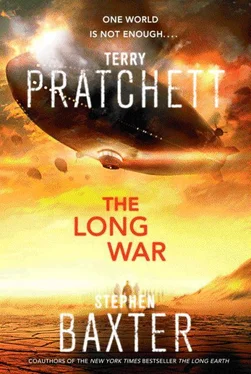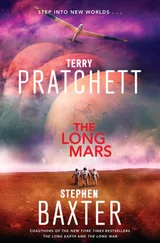Terry Pratchett - The Long War
Здесь есть возможность читать онлайн «Terry Pratchett - The Long War» весь текст электронной книги совершенно бесплатно (целиком полную версию без сокращений). В некоторых случаях можно слушать аудио, скачать через торрент в формате fb2 и присутствует краткое содержание. Год выпуска: 2013, ISBN: 2013, Издательство: Harper, Жанр: Фантастика и фэнтези, на английском языке. Описание произведения, (предисловие) а так же отзывы посетителей доступны на портале библиотеки ЛибКат.
- Название:The Long War
- Автор:
- Издательство:Harper
- Жанр:
- Год:2013
- ISBN:978-0-06-206777-7
- Рейтинг книги:4 / 5. Голосов: 1
-
Избранное:Добавить в избранное
- Отзывы:
-
Ваша оценка:
- 80
- 1
- 2
- 3
- 4
- 5
The Long War: краткое содержание, описание и аннотация
Предлагаем к чтению аннотацию, описание, краткое содержание или предисловие (зависит от того, что написал сам автор книги «The Long War»). Если вы не нашли необходимую информацию о книге — напишите в комментариях, мы постараемся отыскать её.
The Long War — читать онлайн бесплатно полную книгу (весь текст) целиком
Ниже представлен текст книги, разбитый по страницам. Система сохранения места последней прочитанной страницы, позволяет с удобством читать онлайн бесплатно книгу «The Long War», без необходимости каждый раз заново искать на чём Вы остановились. Поставьте закладку, и сможете в любой момент перейти на страницу, на которой закончили чтение.
Интервал:
Закладка:
Now the screen showed images of the crowd before Keyes, who were making sign-language gestures, just like the troll at the Gap, and chanting, “ I will not! I will not! ”
Helen had lost her father to the screen, to the speech, to the commentaries that would follow. Quietly she stood and crept out of the room. He didn’t look round.
Helen knew nothing about revolutions. She couldn’t imagine what might flow from this moment. She did wonder, however, about where the “rights” of the trolls and other creatures who had to share the Long Earth with mankind might fit into all this.
Thomas Kyangu was waiting for her in the lobby, with sympathetic eyes. She guessed he knew enough about her complicated family now to understand how she was feeling.
“Come on,” he said. “I’ll stand you a Valhallan coffee.”
And, in a cosy coffee shop a couple of blocks away, Thomas told her something of his own story.
11
Thomas Kangu could remember precisely the day his life had turned. The day he had left the conventional world and become a professional comber—if that wasn’t a contradiction in terms. It had been twenty years ago, just five years after Step Day itself, when the whole phenomenon was still startling and new. Thomas had been thirty years old.
He had borrowed his father’s car, had driven out of Jigalong to a weathered wooden marker, and climbed out into the midday heat, Stepper box at his side. Apart from the dirt road back to Jigalong, and a fenced-off scrap of bloodstained land that marked the portal to stepwise roo farms, there was nothing here, even in the Datum. Nothing but the expanse of the Western Desert, vast, crushing, its flatness broken by a single, heavily eroded bluff of rock. Nothing anyhow in the eyes of the first Europeans to come here, who had barely been able even to see the people who already lived here. To them it was a terra nullius , an empty land, and that had become a legal principle which justified their land-grab.
But Thomas was a half-blood Martu. He had always been welcomed by his mother’s people, even though her marriage, to a white man for love, had broken the Martu’s strict marriage rules. And to Thomas’s eyes, educated in the ways of his ancestors at least to a theoretical level, this land was rich. Complex. Ancient: you could feel the weight of deep time here. He knew how this at first glance barren land worked, how it supported its freight of life. He even knew how to survive, how to feed himself out here, if he had to.
And he knew of a secret out here, that was his alone.
He bent to look into a cave, cut into the side of the bluff by millennia of wind. It was hardly a cave at all, just a hollow half choked by dry drifting sand. But it was a site he had discovered for himself as a boy, visiting his grandparents at Jigalong, exploring alone in the bush: even then he’d been a solitary kid. And, so deep inside the cave you had to crouch to see, there was the Hunting Man, as he called it, a stick figure with some kind of spear chasing a huge, ill-defined creature, while spirals and starbursts spun around him. It was thousands of years old, he’d figured out, as you could tell by the patina over it.
And, as far as he knew, it had been discovered by nobody before his own boyish eyes had settled on it. Nobody found it later, either. He’d kept the secret of it ever since.
He’d always thought of the Hunting Man as a kind of friend. An invisible companion. A stable point in a life of whirling change.
Thomas had been a bright kid. Picked out of the local school and groomed for better things, he’d gone to college at Perth and even spent some time in America, before returning to Melbourne to become a whizz-kid games designer. He’d been black enough to serve as a poster boy for liberals, white enough that those around him had been able to treat him as one of their own.
Then he’d had his crisis of conscience, and he started to find out about the plight of the people he’d left behind, his mother’s family. How a culture a staggering sixty thousand years old, a people free and self-sufficient a mere three centuries ago, had become the most dependent on the planet: marginalized, removed from their lands, shattered by unemployment and drug abuse, their culture broken up by forced evictions and “white” education. How in his own grandmother’s time her clan had been moved from their country to avoid the British Blue Streak missiles test-launched from Woomera.
Granted, all this hand-wringing had been brought on by Thomas’s own beating-up by a bunch of thugs in Sydney who didn’t like his kind in their city, even one in a suit and tie. But it was a real eye-opener even so.
Then he’d got married. Hannah was a trainee lawyer, another bright young thing, white, from a well-connected New South Wales family. They’d been hoping for a kid.
But then the cancer had taken her, and that had been that. She had been just twenty-three. Helen could sympathize with that part of his story, remembering the suddenness of the loss of her own mother.
After that Thomas’s work seemed pointless. He’d gone back to Perth and worked for a progressive association there, promoting Aboriginal rights. And he’d taken the chance to study his mother’s culture. He’d even become a “native guide” for parties of earnest white tourists. His mother’s family had sneered at that, but he’d learned a lot.
And then had come the Stepper box, and the opening up of the Long Earth. Another huge jolt to Thomas’s personal universe, as to everybody else’s. Many Aborigines, especially young men, had immediately grasped the potential of the technology, and stepped away in search of a better world than the Datum, and its bloody history.
Thomas himself had rarely stepped, in those early days, save for a couple of experiments. Why should he? After all the turnarounds in his life, Thomas no longer felt he knew who he was. He was a contradiction, neither white nor black, married but alone. What was he going to discover about himself out in all those other worlds that he couldn’t find right here? Rather than travel forward, he kept on being drawn back, in fact, to the same point, the Hunting Man in the cave, the one stable locus in his life, like a nail hammered through his psyche.
But this time he had come back here with his Stepper. He had an experiment in mind.
He picked a direction at random, and turned the switch.
Australia West 1.
They were farming kangaroos here, as indeed they were in East 1: he saw heaps of carcasses, tethered horses, a stack of bronze-based rifles heaped up like a tepee. A couple of ranchers sat on a log. When they saw Thomas they raised plastic bottles of beer to him. He waved back.
Roo farming was becoming commonplace, even in the Datum. Kangaroos were efficient as food animals. Pound for pound a roo needed a third the plant material a sheep did, a sixth the water, and produced almost no methane; roo farts were parsimonious. Thomas didn’t object for any rational reasons. It just didn’t feel right. Anyhow this new world was an annexe to the old, and nothing to do with him.
He stepped away, to West 2. And 3. And 4. Each step was a wrench to the stomach, and he needed time to recover.
It took him two hours to get to West 10, where he stopped. He sat on an eroded shelf at the edge of the rocky outcrop, which appeared unchanged from the “original” in the Datum. He looked around, taking his time, absorbing the new world.
And off in the distance he saw movement. A herd of some huge, slow-moving, rather lumbering creatures, seen in silhouette against a pale blue sky. Walking on all fours, they looked like rhinos to his untutored eye. Presumably they were some marsupial equivalent, perhaps hunted by a local version of a lion. There were kangaroos here too, standing up, plucking at the lowest leaves of some tree, but these were big animals, bigger than any roo in the Datum, big and muscular. And there, scampering in the distance, a thing like a dinosaur, a raptor, that was probably a flightless bird. The world was intensely silent, save for the distant bellow of one giant herbivore or another.
Читать дальшеИнтервал:
Закладка:
Похожие книги на «The Long War»
Представляем Вашему вниманию похожие книги на «The Long War» списком для выбора. Мы отобрали схожую по названию и смыслу литературу в надежде предоставить читателям больше вариантов отыскать новые, интересные, ещё непрочитанные произведения.
Обсуждение, отзывы о книге «The Long War» и просто собственные мнения читателей. Оставьте ваши комментарии, напишите, что Вы думаете о произведении, его смысле или главных героях. Укажите что конкретно понравилось, а что нет, и почему Вы так считаете.











